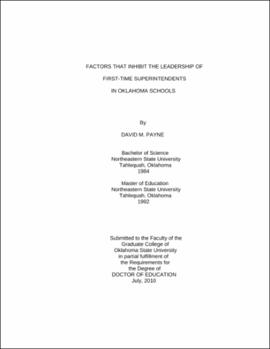| dc.contributor.advisor | Harris, Ed | |
| dc.contributor.author | Payne, David M. | |
| dc.date.accessioned | 2013-11-26T08:34:48Z | |
| dc.date.available | 2013-11-26T08:34:48Z | |
| dc.date.issued | 2010-07 | |
| dc.identifier.uri | https://hdl.handle.net/11244/7532 | |
| dc.description.abstract | Scope and Method of Study: This study examined the challenges faced by first-time superintendents in Oklahoma Schools as well as defined how often the challenges occurred and how difficult they were perceived to be by the superintendents. This study also obtained advice first-time superintendents would give to persons interested in becoming a school superintendent and advice first-time superintendents would give to designers of superintendent preparation programs. Survey research was used to gather the data. The first part of the survey consisted of an assessment of the demographic and background characteristics of the participants. The second part of the survey consisted of an assessment of the frequency with which each participant has faced each of the potential challenges and an assessment of the extent of the challenge caused by each factor. In addition, the survey contained two open-ended questions designed to solicit advice that the participants would give to other first-time rural school district superintendents and to designers of superintendent preparation programs. A combination of descriptive, inferential statistics and quantitative data analysis techniques were used in the study. All inferential analyses were performed using two-tailed tests and an alpha level of .05. The third and fourth research questions were addressed by descriptively categorizing the participants' statements. | |
| dc.description.abstract | Findings and Conclusions: For school district administrators, it was recommended that they remain flexible in both hiring decisions and support for new superintendents. Administrators of superintendent training programs should make several changes based on the results of this study including (a) adding a mentoring component wherein potential superintendents would be develop a mentorship relationship with more experienced superintendents; and (b) developing curricula related to personnel issues, facility issues, state and federal mandates, and superintendent/ board relations. It was also recommended that national organizations develop mentoring programs to ease the transition of new superintendents. By following the recommendations provided above, the transition into a superintendent's role will be eased, and superintendent job effectiveness can be increased. | |
| dc.format | application/pdf | |
| dc.language | en_US | |
| dc.rights | Copyright is held by the author who has granted the Oklahoma State University Library the non-exclusive right to share this material in its institutional repository. Contact Digital Library Services at lib-dls@okstate.edu or 405-744-9161 for the permission policy on the use, reproduction or distribution of this material. | |
| dc.title | Factors that inhibit the leadership of first-time superintendents in Oklahoma schools | |
| dc.contributor.committeeMember | Krumm, Bernita | |
| dc.contributor.committeeMember | Wanger, Steve | |
| dc.contributor.committeeMember | Yellin, David | |
| osu.filename | Payne_okstate_0664D_10982 | |
| osu.accesstype | Open Access | |
| dc.type.genre | Dissertation | |
| dc.type.material | Text | |
| dc.subject.keywords | challenges | |
| dc.subject.keywords | first-time superintendents | |
| dc.subject.keywords | inhibitors | |
| dc.subject.keywords | leadership | |
| dc.subject.keywords | rural schools | |
| dc.subject.keywords | superintendent training programs | |
| thesis.degree.discipline | Teaching and Curriculum Leadership | |
| thesis.degree.grantor | Oklahoma State University | |
